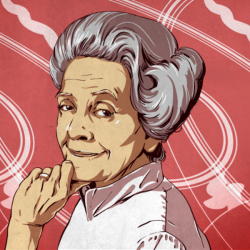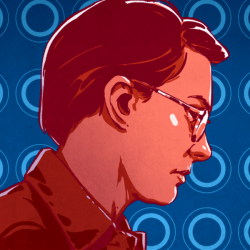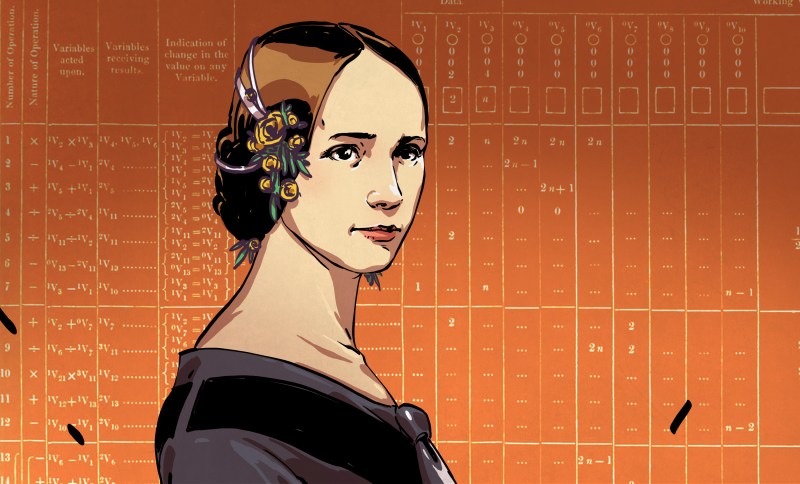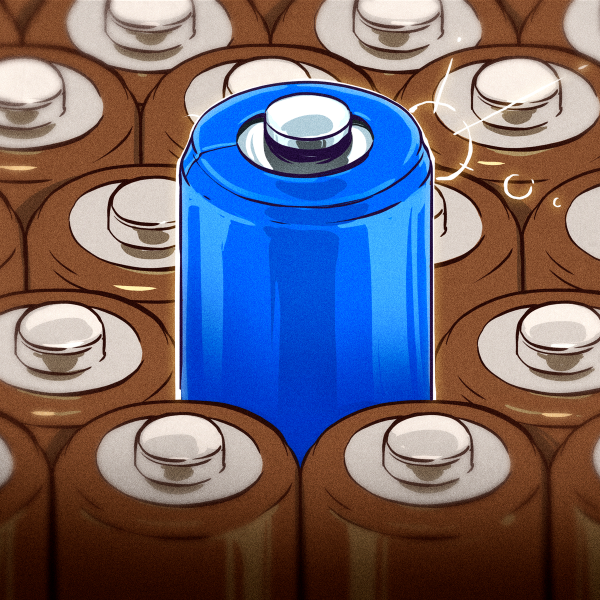Today is Ada Lovelace Day, a day to celebrate and encourage women in the fields of science and technology. The day is named after “Augusta Ada King-Noel, Countess of Lovelace, born Byron”, or Lady Ada Lovelace for short. You can read up more on her life and contribution to computer science at Wikipedia, for instance.
But it’s not really fair to half of the world’s population to dedicate just one day to observing the contributions of female scientists and then lavish all the laurels solely on Lovelace. So last year, the day after Ada Lovelace day, Brian Benchoff sent an internal e-mail at Hackaday HQ suggesting we tell the stories of other women in science. We put our heads together and came up with a couple dozen leads so quickly, it was clear that we were on to something good.
 From a writer’s perspective, the stories of women in science are particularly appealing because they are undertold. Sure, everyone knows of Marie Curie’s brilliant and tragic dedication to uncovering the mysteries of radioactivity. But did you know how Rita Levi-Montalcini had to hide from the Italian Fascists and the German Nazis using fake names, doing research on scarce chicken eggs in her parent’s kitchen, before she would eventually discover nerve growth factor and win the Nobel Prize? We didn’t.
From a writer’s perspective, the stories of women in science are particularly appealing because they are undertold. Sure, everyone knows of Marie Curie’s brilliant and tragic dedication to uncovering the mysteries of radioactivity. But did you know how Rita Levi-Montalcini had to hide from the Italian Fascists and the German Nazis using fake names, doing research on scarce chicken eggs in her parent’s kitchen, before she would eventually discover nerve growth factor and win the Nobel Prize? We didn’t.
Do you know which biochemist is the American who’s logged the most time in space? Dr. Peggy Whitson, the space ninja. But the honor of being the first civilian in space goes to Soviet skydiver Valentina Tereshkova. Margaret Hamilton was lead software engineer on the code that got the first feet on the moon, but in the days before astronauts had learned to trust the silicon, John Glenn wanted Katherine Johnson to double-check the orbital calculations before he set foot in the Friendship 7.
 And on it goes. Maria Goeppert-Mayer figured out the structure of nuclear shells, Kathleen Booth invented assembly language, and Françoise Barré-Sinoussi discovered HIV. Stephanie Kwolek even saved Hackaday writer Dan Maloney’s life by inventing Kevlar.
And on it goes. Maria Goeppert-Mayer figured out the structure of nuclear shells, Kathleen Booth invented assembly language, and Françoise Barré-Sinoussi discovered HIV. Stephanie Kwolek even saved Hackaday writer Dan Maloney’s life by inventing Kevlar.
In all, we’ve written 30 profiles of women in science in the last year — far too many to list here by name. You can browse them all by using the Biography category. (We’ve thrown in biographies of a few men too, because women don’t have a monopoly on neat stories.)
We’re not done yet, either. So thank you, Ada Lovelace, for giving us the impetus to cover the fascinating stories and important contributions of so many women in science!
















Time to mention Else MacGill, engineer, “Queen of the Hurricanes” … https://en.wikipedia.org/wiki/Elsie_MacGill
Cool! We’re open to suggestions! Tipsters, who would you like us to feature?
Hypatia, obviously. Why only mention “young girls”? :-D – math and philosophy
Maryam Mirzakhani, math
Jane Goodall, biology
Dian Fossey, zoology
Maria Reiche, archeology
Lise Meitner, physics
Mileva Marić, physics, math
Irène Joliot-Curie, daughter of THE Curie, chemistry
Josephine Peary, geography
Maria Sibylla Meria, biology
… just a few. The list goes on and on … so many wonderful women, so much history!
Today, some faculties have WAY more women enlisted than men.
Thanks!
BTW https://hackaday.com/2015/12/21/lise-meitner-a-physicist-who-never-lost-her-humanity/ That was one of the first, it didn’t get tagged with the Biography tag.
Like sending suggestions to a Top 40 hard rock radio station that can’t find more than 1 female band to play (New Wave has much better stats). I find no difficulty in listing any number of brilliant women in non-tech fields. Just let it go.
Donna Strickland, 2018 physics nobel prize, contributed improvement to LASER
Nice timing. That article is going live later today: http://hackaday.com/2018/10/10/this-years-nobel-prizes-are-straight-out-of-science-fiction/
In my opinion, one of the most influential people in science at the moment (of any gender) is Alexandra Elbakyan. A genuine open-source pirate. Have HAD done an article on her (and/or sci-hub) yet? If not, why not?
https://en.wikipedia.org/wiki/Alexandra_Elbakyan
Thank you for telling me and all the others about her!
Just want to say that i thoroughly enjoy reading these biographies
I couldn’t have said it better. Please keep them coming!
Great to hear! As Elliot mentioned, we love writing them. Hardest part if finding the people to feature so if you have a favorite that we should feature, please let us know by sending in a tip!
Ditto. I think the biographies are an awesome addition to the HaD content.
+1
I vote for a story on Mary Morgan, a chemist who designed the fuel for the US’s first satellite launch.
https://en.m.wikipedia.org/wiki/Mary_Sherman_Morgan
May I mention Dr. Lynn Conway?
they are even saying that you inherit your iq from your mother (https://www.independent.co.uk/news/science/children-intelligence-iq-mother-inherit-inheritance-genetics-genes-a7345596.html) from my family i can totally agree with this, also my hero paul erdos’s sister was even more brighter then him, but unfortunately she died in a young age, so i clearly can imagine that women are superior to men in the brain department, so i will be very happy to read these kind of articles on hack a day
The Simpson effect — http://simpsons.wikia.com/wiki/Lisa_the_Simpson .
Unfortunately women who are good at the most difficult of mathematics are much rarer than men in every study so far. Looking for parity probably generates false expectations.
The Kevlar story sounds like that needs to be told. Bulletproof vest?
Oh, right, click on the link before commenting. Doh!
Chainsaw!
That’s even more badass than “just” stopping a bullet.
lovelace day sounds like we have a long way to go to appreciate that humans come in two equal genders. remember, mmme curie was the first person to win two noble prices.
Emmy Noether (physics, math) https://en.wikipedia.org/wiki/Emmy_Noether
Done before we began the series https://hackaday.com/2016/06/14/symmetry-for-dummies-noethers-theorem/ Keep em coming anyway.
I wanted to do a post on Noether, but as Steven says, we’re calling her biographied for now. We’ve got sooo much ground to cover.
Almost as important as her physics is her mentoring — many of her students went on to become great as well. It’s a multiplier.
Error 404. Grace Hopper Not Found
+1
https://hackaday.com/2017/12/05/disrupting-the-computer-industry-before-it-existed-rear-admiral-grace-hopper/
Fixed.
Why stop at the sciences? I would hazard a guess Mary Shelly’s Frankenstein is key inspiration to all HaD’ers. https://en.wikipedia.org/wiki/Frankenstein
I say, “Stop at the Sciences”!
If we’re considering bio you can’t forget Barbara McClintock…
Margaret Dayhoff pretty much invented bioinformatics. https://en.wikipedia.org/wiki/Margaret_Oakley_Dayhoff
You might want to check out songofthelark.com
The author there has spent considerable time researching women in classical music and there are some who overlap.
Oh, oh, that might be an interesting topic by itself. There are so many scientists, especially mathematicians and theroretical physicists who also were highly competent musicians. From Max Planck to Brian May (sorry, at the moment only male scientists come to my mind, but you are challenged, HaD, to better that). Is there a fundamental connection? What do you think? And why mainly music and not (so much) painting or acting or dance?
Alexander Borodin:
https://en.wikipedia.org/wiki/Alexander_Borodin
Yes. Yet another female scientist/muscician.
He promoted the concept of women in the sciences…
I’m looking forward to seeing what Cohl Furey comes up with.
https://www.quantamagazine.org/the-octonion-math-that-could-underpin-physics-20180720/
“the-octonion”
Is that like the October issue of The Onion?
B^)
There always has to be one like this ^^^^, right?
https://www.youtube.com/watch?v=nM1-yV10t64
How so?